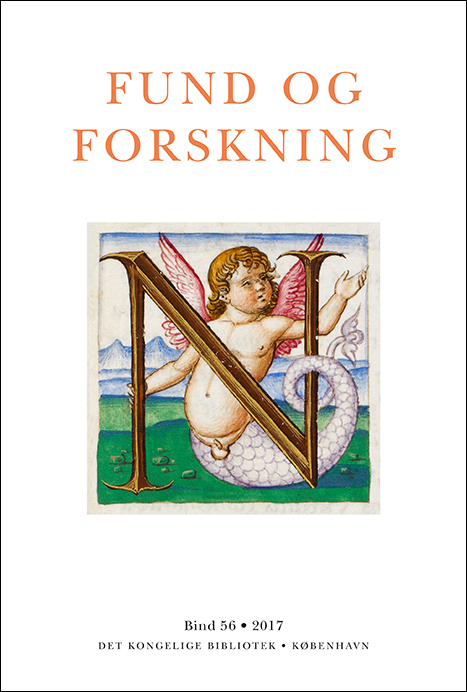Anders Sørensen Vedels Marsk Stig-håndskrift. To kommentarer til Svend Clausens afhandling i Fund og Forskning 55, 2016
DOI:
https://doi.org/10.7146/fof.v56i0.118935Abstract
Ivan Boserup & Karsten Christensen: Anders Sørensen Vedel’s manuscript about Marshal Stig. Two comments on Svend Clausen’s thesis in Fund og Forskning 55, 2016
Svend Clausen has in vol. 55 of Fund og Forskning called attention to a lost and “forgotten” parchment manuscript described by Anders Sørensen Vedel in 1595 as “The History of Marshal Stig” containing key documents related to the trial which followed the assassination in Finderup Grange of King Eric V ‘Glipping’ of Denmark (1259–1286). Clausen’s evidence consists of registrations of manuscripts known only through their titles, which had been available to the Danish historians Anders Sørensen Vedel (1542–1616), Niels Krag (1550–1602), and Jon Jakobsen ‘Venusinus’ (1563–1608), but appear ultimately to have burned in the fire of Copenhagen in 1728. The sources referred to by Clausen were published in one case by H. F. Rørdam in 1874, in all other cases in the appendix to S. Birket Smith’s History of the University Library of Copenhagen, 1882, reprinted 1982.
Apparently inspired by a casual remark made in 1891 by the then very young historian Mouritz Mackeprang, Svend Clausen argues that despite the lack of extant copies and quotations etc., the manuscript’s supposedly exclusively judicial contents and allegedly very considerable volume reveal the “existence” of such an important source that future research on the background and consequences of the royal assassination must take much more account of this lost source than has been the case until now.
Reviewing Svend Clausen’s arguments, Ivan Boserup corrects Rørdam’s and Clausen’s incomplete reading of the source on which the latter builds his identification of Vedel’s manuscript with descriptions of a lost manuscript “Concerning King Eric [Glipping],” and rejects Clausen’s interpretation of “… cum adversariis ac diversis” (Clausen seems unaware of the literary concept of adversaria), on which all his further arguments are based.
From his professional standpoint as a historian, Karsten Christensen refers to Vedel’s strong focus on Marshal Stig in his collection of One Hundred Danish Folk Songs (publ. 1591), to Vedel’s idiosyncratic manner of describing his manuscripts from the point of view of his own main interests, and to the fact that in contrast to the Jens Grand trial held before the Pope in Rome in 1296, one should not expect written actiones to have been delivered at the meeting of the Danish grandees in Nyborg Castle in 1286 subsequent to the murder of Eric Glipping. Christensen therefore suggests that it is much more probable that the manuscript referred to in Vedel’s registration refers to a lost manuscript that, contrary to the one associated by Svend Clausen with Vedel’s lost manuscript, can be followed closely all the way up to 1728, and the contents of which have been detailed by the historian Stephanus Stephanius (1599–1650).


